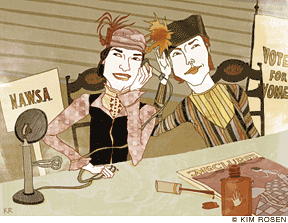
Directed by Katja von Garnier.
Presented by HBO Films.
A soft-edged portrayal of women’s fight for the right to vote.
By Katie Haegele
Leading suffragist Alice Paul Gr’12 was first attracted to the cause by a flamboyant London street protester with a hurdy-gurdy and a monkey. Still an undergrad at Swarthmore, Paul was studying in England when she met radical feminist Emmeline Pankhurst, who was protesting for suffrage at a time when women were rarely permitted to give speeches in public. She caught the fever immediately. And a few short years later at the University of Pennsylvania, where she was earning a Ph.D. in social work, Paul began to formulate her unique strategy to put suffrage at the forefront of the American consciousness.
Iron Jawed Angels, the HBO movie about the final wave of the suffrage movement, opens after Paul had left Penn for Washington, D.C., in 1913. By then the fight for suffrage was already more than 60 years old, but it was flying under the radar. Under old-guard feminist Carrie Chapman Catt, the National American Women’s Suffrage Association (NAWSA) was slowly but surely pushing for state-by-state ratification. Newcomer Paul wanted nothing less than an amendment to the Constitution. And because she used tactics like picketing and hunger strikes, she was considered the foremost radical for the cause.
Perhaps that’s why the film’s director, Katja von Garnier, took such great pains—and liberties—to make Paul (played by Hilary Swank, best known for her Academy Award-winning performance in Boys Don’t Cry, in which she played a young woman posing as a young man) seem as sassily modern as the heroine of a chick-lit novel. Indeed, the first time we see Paul’s coconspirator Lucy Burns (played as a likable upstart by Frances O’Connor), the two are having a friendly squabble over a pretty pink hat in a shopkeeper’s window.
The film is correct in highlighting the 1913 event that debuted Paul’s public persona: a parade up Pennsylvania Avenue that upstaged Woodrow Wilson’s inauguration the next day. In Founding Sisters and the 19th Amendment, the book that inspired the movie, author Eleanor Clift says Paul raised more than $14,000 for the parade—a remarkable sum at a time when the average annual salary was $621. Led by fellow suffragist leader Inez Milholland (Julia Ormond), dressed in white robes and riding a white stallion, the pageant drew the nation’s attention—as well as the ire of many men, whose mob violence ended up injuring hundreds of the marchers. Later, when Paul was thrown in prison for picketing a wartime president, she went on a hunger strike and endured painful and injurious force feedings. (The film’s title derives from the resistance of Paul and Lucy Burns to being force-fed in prison.)
But even though it has all this very real drama to draw from, Iron Jawed Angels dreams up a troublesome romance between Paul and a political cartoonist named Ben Weissman (Patrick Dempsey), too.
In reality, little is known of Paul’s personal life. A modest and serious woman who was raised in the Quaker tradition, she kept few personal papers and only wrote letters that Clift, in her book, calls “practical.” The Weissman character is a composite, the only person depicted in Iron Jawed Angels who didn’t actually exist, yet much of the film’s tension comes from their courtship, which is peppered with sitcom-style repartee, and Paul’s decision to put her work before him. It’s all very silly, and you can almost feel the film’s creators’ giddiness as they toss real details into the mix: We can have Doris Stevens steal Alice’s boyfriend! She was, like, a real suffragist!
Other personal details are so modernized, they’re anachronisms. For one thing, that blasted pink hat keeps turning up, both on Paul’s head and in her conversations, serving as a signal of her femininity as well as an anachronistic nod to what’s thought of today as “post-feminism”—the idea that a girl can love her lip gloss as much as her liberty. The film’s other style choices range from goofily feminine to downright lurid; believe it or not, Swank has a masturbation scene that is so horribly miscalculated it’s hard to decide if it’s offensive or just humorous.
Anjelica Huston is the stately, stuffy Catt, an old-school foil for Paul’s progressive ideas, and eventually Paul breaks away from NAWSA to form a single-platform party. The film would have you believe that it was only their personal conflict that caused the rift; at one point Swank-as-Paul says wearily, “I didn’t intend to fight against other women.” But according to Founding Sisters author Clift, Paul had something more fearsome up her sleeve: she wanted a party that would shake things up and, in Paul’s own words, “terrify” the men in Congress.
To give credit where due, the movie doesn’t shy away from the painful conflict between black and white activists in the movement, and it shows how Paul forced black women to march in the back of her parade to appease southern suffragists. Also, as it does with shows like Six Feet Under and The Sopranos, HBO makes use of interesting music and lovely art direction to tug at the emotions.
Most likely, the dramatized touches are meant to make Paul more “real,” or to show the sacrifices made for the cause. But they’re not only distracting, they’re unnecessary. For instance, the fictitious Weissman, the only non-monstrous male character in the movie, could have been replaced with historically accurate details—like the fact that one in 20 marchers in Paul’s parade were men, or that by 1913 there were 25 states that had men’s suffrage groups.
As admirable as it is to remind viewers that the issues raised by Paul are relevant today, the film’s problems submerge its usefulness. Why play into the idea that viewers can only accept a stereotypical depiction that they recognize from Sex and the City? Besides, depicting Paul as a “modern” figure actually softens the story’s edges. It would have been much more powerful to see her accomplishments in the context of her time. The story of a woman born in the 19th century who was far better educated than most men or women even today, a woman who was true to herself in a way that’s unusual for any time—that kind of story would make a great movie.
Katie Haegele C’98, a linguistics major when she was at Penn, now writes personal essays and reviews, and one of her short stories appears in the new anthology Women Behaving Badly(Paper Journey Press).




